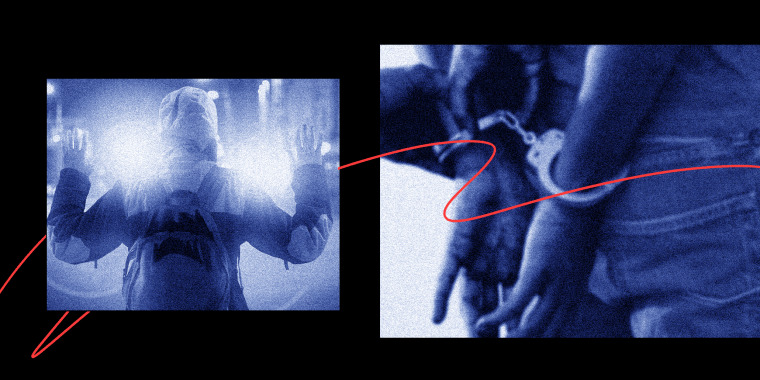Just about every Black person in this country has been given or has given ‘the talk,’ the depressing but necessary message to Black children to expect to be treated differently by police. But my home state of Tennessee has provided a great illustration that the mistreatment doesn't stop with the police, but includes an entire system that treats Black children as less than.
They were booked with “criminal responsibility for conduct of another,” a crime that doesn’t exist.
ProPublica and Nashville Public Radio have reported on a disturbing sequence of events in 2016, in Rutherford County, miles from where I grew up.
Eleven kids were arrested after a video of a 5-year-old and a 6-year-old fighting was uploaded to YouTube. Local authorities under the guidance of Judge Donna Scott Davenport had the children (ages 8 to 14) locked up for literally nothing. Their alleged crime was not stopping the fight, and they were booked with “criminal responsibility for conduct of another,” a crime that doesn’t exist.
The 5-year-old and 6-year old who fought only evaded arrest because they were so young. Some of the older children were arrested at school, even though the fight didn’t occur there.
The story of the arrests is shocking enough, but Rutherford County authorities were able to jail some of the children because of a “filter system” the head of the detention center implemented. According to ProPublica’s report, “Under the filter system, the child would be locked up if deemed ‘unruly.’ But the filter system defines ‘unruly’ simply as ‘a TRUE threat,’ while ‘TRUE threat’ is not defined at all.”
In a memo to school resource officers in the county, Lynn Duke, the director of Rutherford County Juvenile Detention, wrote, “Even if we would normally release a juvenile ... any time a local law enforcement officer requests a juvenile be detained and agrees to come to court to testify we will hold the juvenile.”
Translation: throw kids in jail if they are Black and you feel like it.
Only recently has our country begun to reckon with the reality that our criminal justice system is not fair and that officers’ claims that they feel “unsafe” or whatever other words they use, have been used to justify huge rates of police violence.
And the protests that have sprung up since the 2014 killing of a Black teenager named Michael Brown in Ferguson, Missouri, to the 2020 killing of George Floyd, have sparked meaningful public conversations about realities many of us face today in regards to being shot by police.
We have yet to have a meaningful national dialogue on the way police and school officials treat Black children like adults.
But we have yet to have a meaningful national dialogue on the way police and school officials treat Black children like adults and push them into jails and prisons.
Since the 1970s, there’s been a consistent trend across the country of schools implementing harsher penalties, normalizing the expulsion of children for various infractions that put them on an immediate path to juvenile incarceration.
Most of the research has found that the burden falls most heavily on Black students, as it has in Rutherford County.
In 2015, there was the viral video of a young Black girl from South Carolina being brutalized by a school resource officer for allegedly using her cellphone — and her story is not abnormal. We just rarely talk about it. However, the experiences of this girl and the children in Rutherford County make them poster children for our country’s "school-to-prison" epidemic.
The danger of these practices extends beyond violence. Thrusting children as young as 8 into the criminal justice system may cause them to spend the rest of their lives moving in and out of that system. According to recent research from the Massachusetts Institute of Technology, almost 40 percent of people who are incarcerated as kids will re-enter the criminal system before they’re 25. And often, they’re incarcerated as children for nothing or for something minor.
Although the children in the ProPublica report were arrested and jailed in Tennessee and the viral video of the Black girl being manhandled by a school resource officer was recorded in South Carolina, this is not a Southern problem. This is an issue that will continue to exist across the country until we dismantle this white supremacist system we live in.
The Associated Press reported Monday that over 25 police forces across the country have used excessive force on kids under 16, and 50 percent of kids subjected to excessive force are Black despite only making up 16 percent of the entire population.
We as a country haven’t expanded our imagination wide enough to let Black and brown kids exist as kids.
We get data like that, in part, because just about every school in this country has policies that would allow some version of what’s happening in Tennessee to happen on its campus. Why? Because we as a country haven’t expanded our imagination wide enough to let Black and brown kids exist as kids.
Exist as kids who mess up. Exist as kids who can be better if people invest in them and show them the right path. Exist as kids who, if given the same opportunities as rich white kids in wealthy suburbs, could also become doctors or nurses or lawyers and wouldn’t have to navigate the complicated paths currently laid out in front of them.
This can only happen if we all work to ensure schools are no longer the feeder system for prisons looking for more bodies to use and abuse.
